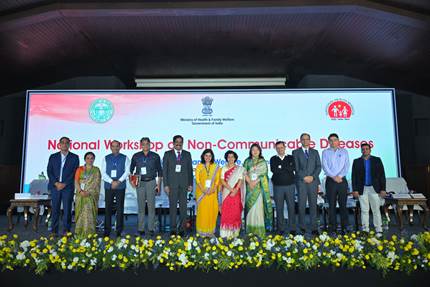Union Health Ministry emphasized the need for inter-sectoral collaboration, enhanced research, and innovative practices to address the growing burden of NCDs
- “This national workshop marked a significant step toward achieving the government’s vision of a “Healthy India”, with an emphasis on universal access to quality healthcare services and the reduction of premature mortality from NCDs”
- Conference featured comprehensive discussions, field visits, and knowledge-sharing sessions addressing different aspect of major NCDs, including Diabetes, Hypertension, CKD, CRD, NAFLD, Stroke, and Cancer
The Union Health Ministry in collaboration with the Government of Telangana, successfully hosted a two-days National Workshop on Non-Communicable Diseases (NCDs) on January 8–9, 2025. The workshop, which brought together key stakeholders including Principal Secretaries (Health), Mission Director-National Health Mission and other senior officers from all the States and Union Territories, health professionals, and policymakers from across the country, focused on strengthening strategies for the prevention, screening, management, and treatment of NCDs.
Smt. Punya Salila Srivastava, Union Health Secretary emphasized the need for inter-sectoral collaboration, enhanced research, and innovative practices to address the growing burden of NCDs. She stated that “this national workshop marked a significant step toward achieving the government’s vision of a “Healthy India”, with an emphasis on universal access to quality healthcare services and the reduction of premature mortality from NCDs.”
She further remarked that “this conference will help in strategizing the priorities of the Ministry of Health and Family Welfare while submitting proposals before the 16th Finance Commission of India for strengthening the health care system including prevention and control of NCDs.”
The conference featured comprehensive discussions, field visits, and knowledge-sharing sessions addressing different aspect of major NCDs, including Diabetes, Hypertension, Chronic Kidney Disease (CKD), Chronic Respiratory Disease (CRD), Non-Alcoholic Fatty Liver Disease (NAFLD), Stroke, and Cancer.
The workshop commenced with field visits to key health facilities in Telangana, where participants observed best practices and innovative approaches to NCD management at the ground level. These visits provided critical insights into the operational aspects of primary and secondary healthcare interventions.
Community-based interventions were a major focus, with sessions emphasizing the role of campaigns such as Fit India and Eat Right India. Nagaland’s exemplary tobacco cessation and deaddiction initiatives and Telangana’s integration of yoga and wellness practices were highlighted as replicable models for other states.
State-specific practices received particular attention. Assam’s hypertension control program, Tamil Nadu’s comprehensive NCD screenings, and Andhra Pradesh’s robust cancer care infrastructure were showcased for their innovative approaches and outcomes. Presentations from other states showcased how tailored strategies can address regional challenges effectively. By tailoring approaches to cultural and regional contexts, these programs have achieved notable success and offer replicable strategies for other states.
A special session on research priorities underscored the need for implementation research to bridge gaps in prevention, screening, and treatment.
Presentations on challenges in screening, diagnosis, and management of NCDs by eminent experts from various medical institutions in the subject domain such as ST Elevation Myocardial Infarction, Chronic Kidney Disease, Chronic Respiratory Disease, Non-Alcoholic Fatty Liver Disease, and Stroke were presented where the experts shared their views and experiences to reduce the burden of NCDs.
Special focus was placed on strengthening cancer care infrastructure, with sessions on augmenting cancer care at district hospitals, the role of tertiary care centers, and population-based cancer registries. Strategies to address gaps in cancer care—from screening to follow-up—were explored in depth, with contributions from leading experts in Oral, Breast, and Cervical Cancer.
Best practices from Telangana and Tamil Nadu were discussed for strengthening secondary-level NCD clinics and expanding comprehensive screening programs.
Background:
India is currently facing an unprecedented rise in Non-Communicable Diseases (NCDs), which account for over 66% of all deaths across the nation. With the rapidly changing demographic and epidemiological landscape, the burden of NCDs such as cardiovascular diseases, diabetes, chronic respiratory diseases, and cancers has become a significant public health challenge, particularly among individuals over the age of 30.
Recognizing the urgency of addressing this growing burden, the Government of India has implemented the National Programme for Prevention and Control of Non-Communicable Diseases (NP-NCD) under the National Health Mission. This program has been expanded to include not only the most common NCDs but also other critical conditions such as Chronic Obstructive Pulmonary Disease (COPD), chronic kidney disease (CKD), Non-Alcoholic Fatty Liver Disease (NAFLD), and dialysis services under the Pradhan Mantri National Dialysis Programme (PMNDP).
